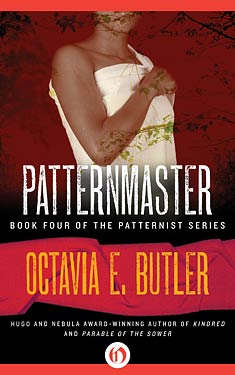Octavia
Butler
Completed 1/11/2019,
Reviewed 1/11/2019
2 stars
This is the
last book in the Patternist series, and the first written. It ties together all the concepts from the
first three novels, or rather, all the concepts of this book were fully
explained in the first three. It speaks
to Butler’s greatness that she had this universe so carefully built that she
was able to create three prequels of extraordinary depth and detail. However, this was Butler’s first novel, besides
being the first in the series, and is the weakest. It lacks the qualities that made the other
three, particularly Wild Seed, far superior.
 The story follows
Teray. He’s fresh out of school and
travelling with a friend and Housemaster as well as his wife, Iray. Teray happens to be the son of Rayal, the
Patternmaster, inheritor of the great telepathic power that connects all the
Patternists. Mary from Mind of My Mind
was the first such Patternmaster. Teray
and his wife are sold to Coransee, the most powerful Housemaster and heir apparent
to Rayal. Coransee is also Rayal’s son,
making the two men brothers. However,
Teray does not want to be subjugated by anyone.
He’s a very powerful patternist, but not as strong as Coransee. Eventually he escapes with Amber, the house healer,
to attempt to get to Forsythe, Rayal’s home.
There he hopes to confront Coransee and fight him for succession to
Rayal’s throne. On the way, they must
keep on guard from the clayarks, the belligerent sphinx-like human species encountered
in Clay’s Ark.
The story follows
Teray. He’s fresh out of school and
travelling with a friend and Housemaster as well as his wife, Iray. Teray happens to be the son of Rayal, the
Patternmaster, inheritor of the great telepathic power that connects all the
Patternists. Mary from Mind of My Mind
was the first such Patternmaster. Teray
and his wife are sold to Coransee, the most powerful Housemaster and heir apparent
to Rayal. Coransee is also Rayal’s son,
making the two men brothers. However,
Teray does not want to be subjugated by anyone.
He’s a very powerful patternist, but not as strong as Coransee. Eventually he escapes with Amber, the house healer,
to attempt to get to Forsythe, Rayal’s home.
There he hopes to confront Coransee and fight him for succession to
Rayal’s throne. On the way, they must
keep on guard from the clayarks, the belligerent sphinx-like human species encountered
in Clay’s Ark.
The plot is a
basic battle for the throne and a large part of it is taken up by the journey
from Coransee’s house to Forsythe. It’s
really a very boring plot. I was waiting for some kind of grand epic confrontation
but it mostly fell flat. What makes it
different and interesting is the Pattern and the clayarks. But because we are equipped with the extensive
background from the prequels, even that is not very exciting.
The prose is
okay, with moments of brilliance. You
can see Butler honing her skills here, but unfortunately she does not approach
the level that she attained in Wild Seed.
Even the characters are a little more cardboard than usual. Again the characters are not very likeable,
and I wanted to have empathy for Teray and Amber, but just couldn’t. However, it does make an interesting
statement about the world of the Pattern, that having these telepathic
abilities do not make life better or easier.
It creates a world of haves and have nots, with the normal humans, or
mutes, being the latter. They are
treated as slaves by the patternists.
It’s
interesting that Butler did not include a story line for the clayarks. All we know about them is that they are simply
the enemy of the patternists. They seem
to have lost intelligence in the time between Clay’s Ark and this book. At least the little interaction we have with
them tells us that their speech has degraded, although some are excellent
marksmen.
I give this
book two stars out of five. I think it
was a big disappointment because it was the last book read and the other three
were so much better. It makes me wonder
what my experience of this book would have been if I started with it and read
the rest in published order. This doesn’t
put me off from Butler at all, because I know her writing got so much better
very quickly. I look forward to the
Xenogenesis series, which came later in the 80s.
No comments:
Post a Comment